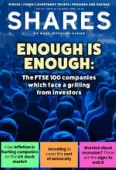Archived article
Please note that tax, investment, pension and ISA rules can change and the information and any views contained in this article may now be inaccurate.
Enough is enough: The FTSE 100 companies which face a grilling from investors

A significant number of FTSE 100 companies could face shareholder rebellion over the coming weeks as investors increasingly put pressure on boards over key issues.
There is a long list of topics which could dominate this year’s annual shareholder meeting season, which gets into full swing at the end of April.
These include environmental policy and climate change action, boardroom and workforce diversity, nutrition and its impact on obesity, and human rights. Protests about bloated bonuses, management pay, and long-term share price underperformance may also feature heavily.
Significant pressure on a company could result in various actions which might ultimately benefit investors, customers, society and the environment – so what happens at AGMs can truly make a difference.
ACTION HAS ALREADY BEGUN
This year has already seen Fundsmith Equity Fund (B41YBW7) manager Terry Smith use his annual shareholder meeting to put the boot into Unilever (ULVR), the international consumer goods giant that was one of the fund’s five worst performers in 2021.
Smith attacked the Marmite-to-Magnum ice cream maker saying it ‘seems to be labouring under the weight of a management which is obsessed with publicly displaying sustainability credentials at the expense of focusing on the fundamentals of the business.’
The fund manager hinted at possible fireworks at Unilever’s annual general meeting scheduled for 4 May. ‘This should be a business which is capable of performing better than it has,’ Smith told Fundsmith Equity Fund investors in March.
Unilever has been a core holding for thousands of retail investors and funds over the years. Its share price increased more than tenfold between 1990 and 2019 when it hit £50. That’s all changed since chief executive Alan Jope, a Unilever ‘lifer’ who joined the firm at 18, took the top job in May 2019. Under his leadership the shares have fallen by a third to approximately £34.
Terry Smith has a simple solution: ‘To be blunt, we think it’s easier to change the management than it is to change the business.’
NAMES TO WATCH
Unilever is far from alone in attracting criticism from shareholders. Insurer Aviva (AV.), pharmaceuticals firms GlaxoSmithKline (GSK) and AstraZeneca (AZN) and retail bank Lloyds (LLOY) could all endure an uncomfortable face-off with shareholders at their respective AGMs this year.
Other names to watch include engineer Rolls-Royce (RR.), cigarette maker British American Tobacco (BATS), education publisher Pearson (PSON) and supermarkets Tesco (TSCO) and Sainsbury (SRBY).
And perhaps the biggest drama could involve the shareholder meetings of energy giants BP (BP.) and Shell (SHEL).
‘The themes that will prevail in 2022 are strategic repositioning, operational efficiencies, capital allocation decisions and ESG,’ says Marco Taricco, co-founder of Bluebell Capital Partners.
Anne-Sophie d’Andlau, partner and deputy CEO at investment firm CIAM, sees the European telecoms sector coming under scrutiny from shareholders this year, which implies action at BT’s (BT.A) and Vodafone’s (VOD) annual investor meetings.
‘We expect to see increased shareholder activism across the sector, especially around capital returns. We also expect to see increased M&A activity across the sector, including some transformational mergers,’ she says.
CLIMATE CLARITY
Climate change is likely to be one of the hot button issues. Shareholder pressure has been building for some time for companies to give greater transparency over environmental policy and improve disclosure on what’s being done, according to law firm Ashurst.
It flags several companies in the oil and gas, mining and utilities sectors to have already been cajoled by investors to formulate climate aims. These include Glencore (GLEN), BP, Shell, National Grid (NG.), BHP (BHP), Severn Trent (SVT) and SSE (SSE).
QUESTIONS FOR BP AND SHELL
Soaring oil and gas prices following Russia’s invasion of Ukraine pose various conundrums for investors in BP and Shell. These questions are likely to be asked by shareholders at their AGMs in May:
Are the energy giants going to do a U-turn on oil and gas by investing more money in production, given the energy squeeze being felt by the West as it attempts to cut its dependence on Russian supply?
If so, what might this do to their respective energy transition plans to renewables?
Are BP and Shell in danger of overpaying for renewable energy assets against this industry and political backcloth?
PRESSURE ON BANKS AND INSURERS
There are numerous financial institutions in the firing line, including Barclays (BARC), HSBC (HSBA) and Aviva.
Both Barclays and HSBC have been criticised this year by activist group ShareAction for continuing to finance new oil and gas projects despite signing up to green banking group the Net Zero Banking Alliance. There is also clear guidance from the International Energy Agency that net zero means no new oil and gas projects.
According to ShareAction data, European banks have provided over $400 billion to the top 50 oil and gas producers since 2016. HSBC and Barclays are among the worst offenders, providing $59 billion and $48 billion respectively.
In March, Barclays’ long-awaited climate plan, which it will put to a shareholder vote at its annual investor meeting on 4 May, came under fire for not going far enough.
‘Barclays’ Say on Climate plan lacks the ambition needed to address the climate crisis,’ says Lydia Marsden, senior research officer at ShareAction. ‘By failing to update its oil and gas policy it can continue to finance Paris misaligned activities such as oil sands and new oil and gas. Investors need to question whether Barclays’ policies and targets truly mark progress or instead enable business as usual for its clients.’
ShareAction is calling for shareholders to vote against Barclays’ climate strategy at the bank’s AGM next month.
ACTIVISM WITH SHARPER TEETH
Shareholder activism is not new and organisations such as Pirc, Institutional Shareholder Services and Glass Lewis have long been vigilant on corporate governance breaches and shareholder votes.
US-based Elliott Management, founded by Paul Singer and one of the most high profile activist fund groups, encouraged Whitbread (WTB) to sell its Costa Coffee business in 2018, eventually bought by Coca-Cola (KO:NYSE) for £3.9 billion, leaving Whitbread to concentrate on its hotels business.
But activism has intensified in recent years, and retail investors are also being called to take up the challenge.
There are some great examples of shareholder action at work. According to ShareAction, 36 of the 100 largest companies in the UK are now real living wage employers, while large organisations such as Tesco, Vodafone and BT have signed up to source 100% renewable electricity.
Following strong investor engagement, HSBC has made new climate commitments and agreed to phase down its financing of fossil fuels in line with what’s required to limit global temperature rise to 1.5C. The bank plans to publish its new climate strategy by the end of this year.
PEARSON UNDER FIRE
Pearson’s AGM on 29 April could be among the more hostile of this year’s batch. The company has come under attack from shareholders thanks to its history of profit warnings, failed strategic rethinks and its refusal to engage with private equity firm Apollo about a takeover.
In February, fund manager Nick Train told Finsbury Growth & Income Trust (FGT) shareholders at their annual meeting that he had finally ditched the trust’s stake in Pearson after years of having to justify why it continued to own this underperforming stock. The share price has halved over the past seven years.
DISCLAIMER: The author (Steven Frazer) and article editor (Daniel Coatsworth) own units in Fundsmith Equity Fund
Important information:
These articles are provided by Shares magazine which is published by AJ Bell Media, a part of AJ Bell. Shares is not written by AJ Bell.
Shares is provided for your general information and use and is not a personal recommendation to invest. It is not intended to be relied upon by you in making or not making any investment decisions. The investments referred to in these articles will not be suitable for all investors. If in doubt please seek appropriate independent financial advice.
Investors acting on the information in these articles do so at their own risk and AJ Bell Media and its staff do not accept liability for losses suffered by investors as a result of their investment decisions.
Issue contents
Feature
- Enough is enough: The FTSE 100 companies which face a grilling from investors
- Specialist distributor Diploma is a rare winner from global supply chain constraints
- How investors including people in retirement should deal with 7% inflation
- A complete exit from Russia is likely to cost companies dearly

 magazine
magazine








